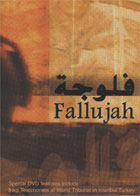
Fallujah 2006
Distributed by Deep Dish TV, 339 Lafayette St., New York, NY 10012; 212-473-8933
Produced by Deep Dish TV and Code Pink, Creative Commons
Directed by Hamudi Jasim, Brandon Jourdan, Jacquie Soohen
DVD, color, 30 min.
College - Adult
Middle Eastern Studies, Human Rights
Date Entered: 02/16/2007
Reviewed by Rebecca Adler, College of Staten Island, City University of New YorkImmersion in the horrors of war experienced through the immediacy of film, with the inevitable scenes of collateral damage (was there ever a more sanitized cynical euphemism?), can only leave one numb, wordless -- not a time to ask why, how … until perhaps later, much later…. In the city of Fallujah, Iraq, in November 2004, after a particularly brutal kidnapping and lynching of four Americans (civilians actually, working for a private company under military contract), the American Army launched an all-out assault on the city, killing and maiming in the process hundreds if not thousands, most of them bystanders in the conflict. Almost all of Fallujah’s 400,000 residents were driven out of the city. The city, two-thirds of it destroyed, was rendered desolate. In the aftermath Iraqi filmmaker Hamudi Jasim, sponsored by an anti-war American production company, Code Pink, led a team of videographers and investigative reporters to Fallujah to record the destruction and to interview survivors. The resulting film makes no effort to be a coherent film as such, it rather appears to be cobbled together from raw footage to provide the case for the prosecution at a war crimes tribunal. With no voiceover narration, the film is abruptly introduced by two or three mid-screen titles naming time, place, and perpetrator. A battle skirmish follows – the bombardment of a wall badly injures one of the men seeking shelter behind it. For the rest the city lies in ruins. The half dozen or so interviews that make up the rest of the film take place amid the ruins and in a tent area set up for the refugees. The testimony of the survivors spoken directly to the camera is passionately, angrily given, and with cause – the deaths, the losses described are devastating, irreparable. One’s emotions listening to the testimony are only slightly attenuated by the feeling that the words, in their repetition from witness to witness, may have been rehearsed. Still, one trusts it’s not too callous to say that a number of PBS Frontline programs over the past years have better told the story of Iraqi suffering with as much compassion for the innocent victims and as much outrage at the events that brought that suffering about. In addition, there are as well a number of independent documentaries that tell the same story. Among them are Voices of Iraq (Magnolia Pictures, 2004), My Country, My Country (Zeitgeist Films, 2004), and Iraq in Fragments (Typecast Releasing/HBO Films, 2006). An added segment on the DVD presents testimony presented by two Iraqis given at a tribunal held in Istanbul, Turkey in early 2005.